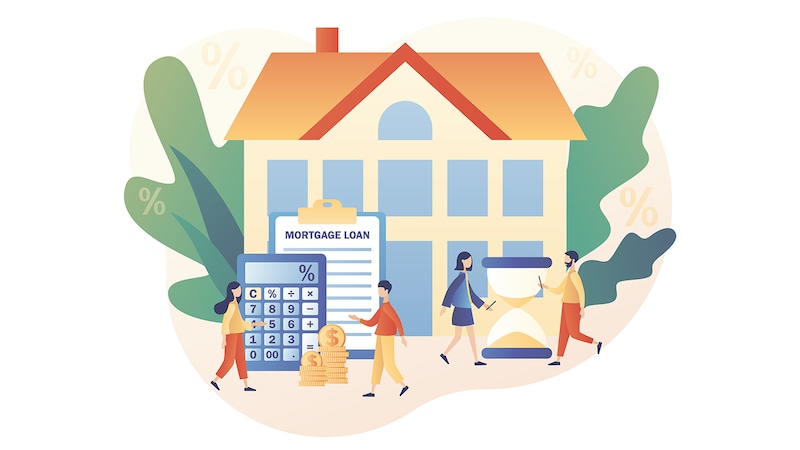Credit scores used by mortgage lenders

Highlights
- Mortgage lenders use your credit score as well as other financial factors to determine whether or not to approve your mortgage loan application.
- Two of the most common scoring models include the FICO Score and the VantageScore.
- Paying down debt and showing positive payment history along with other factors may help improve your chances of being approved for a mortgage.
When it comes to applying for a mortgage, understanding the credit score landscape can be helpful. Mortgage lenders rely on various factors, including your credit score, to evaluate your creditworthiness before approving a loan. Of course, available funds for a down payment, current income and the specific standards of the lender play a role as well.
In this article, we will dive into the scores and models commonly used, factors influencing loan terms, and effective ways to help enhance your credit score before applying for a mortgage.
Score ranges and models lenders may use when you apply for a mortgage
When assessing mortgage applications, lenders rely on your credit score and credit report to gauge your creditworthiness. Most likely they will use one of the two main credit scoring models, FICO or VantageScore. They basically differ on how they weigh your financial behavior, but both were created with the aim of providing a standardized credit scoring model where higher scores denote stronger creditworthiness.
It's important to recognize there are multiple FICO score versions, though. These are different models used over the years and they’re often referred to by a number such as “FICO Score 2” or “FICO Score 4”, which are fine-tuned for mortgage-related assessments.
Both FICO and VantageScore consider factors such as payment history, credit utilization, credit age and types of credit to determine the score, but each may be weighted differently. Some lenders may choose one scoring model over the other based on their preferences and industry practices.
As prospective homebuyers navigate the mortgage application process, it’s helpful to understand these models and their score ranges.
What else do mortgage lenders use to determine your terms?
In addition to your credit score, mortgage lenders consider several other factors when reviewing applications and deciding loan terms if approved. These factors collectively provide a comprehensive picture of your perceived ability to repay the loan. These factors may include:
- Income and employment history
- Debt-to-income ratio (DTI)
- Down payment amount
- Loan-to-value ratio (LTV)
- Any negative entries or derogatory remarks on your credit report
- Cash reserves or assets
- Loan amount
- Property type and use
- Market conditions
Knowing these factors and proactively enhancing your financial profile may better position your mortgage application.
How to improve your credit score before applying for a mortgage
While there is no quick fix to clean up your credit, there are some steps you can take to help improve your credit score and increase your chances of being approved for a mortgage.
Check your credit reports
Reviewing your credit report is the first step in finding any information that's negatively affecting your score. Run your report with the three major bureaus and use the information to understand and manage your credit. You are entitled to a free annual credit report from each of the three credit bureaus.
If you find any errors in your report, you must notify the proper bureau and creditors as soon as possible. Lenders usually require disputes to be resolved before you apply for a mortgage to make sure your credit score is accurate.
Pay off delinquent accounts
Payment history represents the greatest percentage of your credit score, (35%) for the VantageScore model. If you currently have any delinquent accounts, paying them off before submitting a mortgage application may help better position you for an approval.
Delinquencies may include any past due payments, charge-offs, collections or judgments that may be in your report. A delinquent-free report lets mortgage lenders know you may be a low-risk, responsible borrower.
Make payments on time
When reviewing your application, lenders will look for consistency in your financial behaviors. Because they're looking at historical information, there are no shortcuts to establishing a solid pattern of timely payments. Therefore, every payment you make on time is important. It's a step toward building a good credit history and could bring you a little bit closer to your dream home.
It takes some time to build your credit score back up after delinquencies and late payments. If you have these in your report, it may be a good idea to keep your accounts in good standing for several months before applying for a mortgage.
Pay down your balances
Paying off your revolving loans every month is a good financial habit that has a positive effect on your credit score—for example, paying your credit card’s full balance instead of just the minimum payment due. It allows you to demonstrate a solid payment history while also lowering the total amount owed.
One way to boost your credit score is to lower your balances to 30% of your credit limit, which translates to a generally acceptable credit utilization ratio.
Know how much you can afford to borrow
Understanding your personal finances is essential when considering a mortgage. If you know the monthly dollar amount that's manageable for your personal budget, the chances of missing or struggling with payments could be lower. It’s wise to choose a house that you can comfortably afford based on your income and lifestyle.
Ultimately, how much you can afford depends on your particular situation and finances. Use our online mortgage calculator to help you determine what percentage of your salary should go towards a mortgage loan.
In summary
Applying for a mortgage is a big step in anyone’s financial journey. One of the biggest ways you can prepare is to know the factors that lenders consider when deciding if you’ll be approved and if so, what your loan terms may be.



